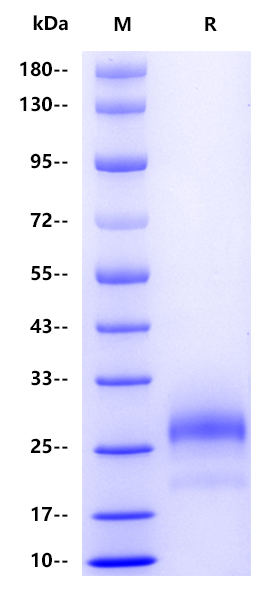Protein sequence(P27814, Gln67-Ser223, with C-10*His) QKPSREKCCVFIQENLNKTTDCSVNLECPQDWLLHRDKCFHVSQVSNTWEEGQADCGRKGATLLLIQDQEELRFLLDSIKEKYNSFWIGLRFTLPDMNWKWINGTTFNSDVLKITGVTENGSCASILGDKVTPESCASDNRWICQKELNHETPSNDSGGGGSHHHHHHHHHH
>90% by SDS-PAGE
12 months from date of receipt, -20 to -70 °C as supplied. 6 months, -20 to -70 °C under sterile conditions after reconstitution. 1 week, 2 to 8 °C under sterile conditions after reconstitution. Please avoid repeated freeze-thaw cycles.
CD161 is one of the earliest markers expressed during NK cell maturation from CD34+ hematopoietic stem cell precursors. Expression of CD161 correlates with the cytotoxic function of CD16+ NK cells, and ligation of CD161 with its ligand LLT1 inhibits NK cell cytotoxicity and cytokine secretion. CD161 is expressed early in NK cell development, where it may facilitate cross-talk of NK cell precursors with cells within the bone marrow, and is involved in CXCL8 release. Within the periphery, cross-linking of CD161 leads to an increase in IFNγ expression and inhibition of NK cell cytotoxicity. There have been various reports of modulated expression of CD161 on NK cells during viral infections. For instance, reduced CD161 expression in acute hepatitis C virus (HCV) infection predicted viral clearance, and correlated with increased liver inflammation in chronic HCV infection. Patients with chronic human immunodeficiency virus (HIV) infection have depleted CD161+ NK cells compared to healthy donors.
Immobilized Mouse NK1.1/CD161, His tag at 2 μg/mL (50 μL/well) can bind NK1.1/CD161 Recombinant Rabbit mAb (S-428-32) (S0B0328) with EC50 of 17.00-23.07 ng/mL.

2μg(R: reducing conditions)